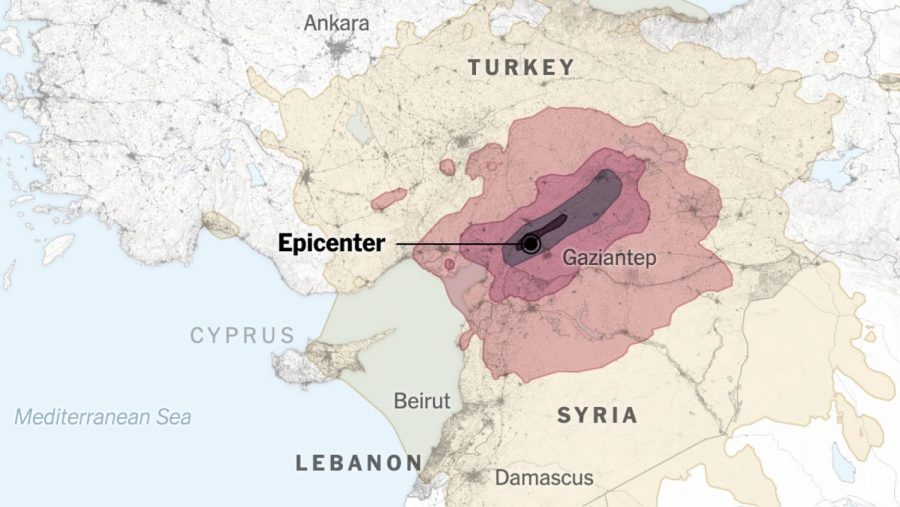Turkish Students Express Their Distress After Turkey-Syria Earthquake Kills Thousands
Map of Turkey and Syria displaying the earthquake’s epicenter and areas most affected. (New York TImes)
February 13, 2023
As buildings crumbled in Turkey and Syria, so did the hearts of the Turkish community of the school who saw their families, friends and country walk into a period of disaster.
The earthquake on Feb. 6 left many in shock even from nearly 6,000 miles away.
With waves of mourning and panic pouring over the countries of Turkey and Syria, Turkish students attempt to prepare themselves for the times of despair and instability to come.
Junior Melina Olfati has family in Turkey that were present when the magnitude 7.8 hit. Luckily, her family was nearly 700 miles away from the epicenter of the disaster.
However, the distance provided little comfort.
“My uncle was crying on the phone worried that it might happen to them. He was saying ‘What if it happens to us? What if we can’t make it to America?’” said Olfati.
Although Olfati’s family escaped the horrors of the events, thousands weren’t as fortunate.
Sophomore Melek Ozcelik has friends whose families live in the affected cities.
“My old best friend’s grandparents are assumed to have passed. They weren’t able to come out, and now it’s been days,” said Ozcelik.
With thousands missing under piles of fallen buildings, or separated from families at times of distress, attempting to locate loved ones becomes impossible.
As hundreds of thousands of citizens go homeless, commotion and disarray fill the streets.
“One of my friends just moved here six months ago from Marash, the city where it happened. She can’t get in touch with any of her friends from Turkey,” Ozcelik said.
In critical times, fallen powerlines and limited electricity make it even more difficult for families to contact one another in hopes of any news that can provide a sliver of hope.
“It’s hard to get into contact with family since they’re all still in shock,” said Ozcelik. Adding that her best friend couldn’t reach her family for the entire day.
“You don’t want people’s phones to die, so you decide not to call too much.”
This combination of delayed communication and a rising death toll only feed into the people’s anxiety.
As of Monday, this natural disaster has officially killed over 36,000 people. These numbers are predicted to increase even more.
“Right now, I think it’s 17,000,” Ozcelik said Thursday. “But as numbers go up it’s not going to be from the earthquake. People are homeless; they’re going to freeze.”
The reality begins to hit as media coverage shows cities demolished, parents mourning and children orphaned.
“You just see so many videos. Fathers losing their children; children losing their mothers,” said Olfati. “I just don’t know how the country can bounce back from this.”
As the death toll rises, so does criticism towards the Turkish government.
“Inflation in Turkey is already really bad, so as is people are barely scraping by to feed their children,” said Olfatii. “I don’t even know what will happen now.”
Some have begun to question the lack of preparation and absence of funds that could’ve potentially … an uncontrollable situation.
“You just wish that if maybe the buildings were more sound, more people could’ve lived,” said Ozcelik. “You can’t really undo that kind of damage.”
The manner of which the Turkish government handles this crisis will be crucial for the country’s upcoming election in May 14.
However, the stress of the moment outweighs any worry of the future.
Any help provided will be deeply appreciated said Olfati.
There are several online resources to donate any amount to aid the people of Turkey and Syria. The International Red Cross has opened up programs accepting donations, as well as CNN with GoFundMe links. These are only two examples of hundreds of organizations assisting in this calamity.
Turkish Airlines is sending items to Turkey for free everyday said Ozcelik.
“Start donating as much as you can. Send anything you can over to Turkey,” said Olfati. “If anyone can bring old jackets, coats, socks, [these] can all make a difference for the people who are freezing and homeless right now.”


audacious new yorker • Feb 13, 2023 at 9:26 pm
A very important story. Great job, Maria. I really feel for all those affected. This is a very TBW story in that it localizes a global/larger-scale issue — these types of articles are super helpful so I’m happy TBW does them often. Keep it up, editor-in-chief! (Also, I can picture Mcdearmon reading through a NYT article about the situation and asking writers about how it can fit TBW’s audience. Love y’all lots, see y’all very soon.)